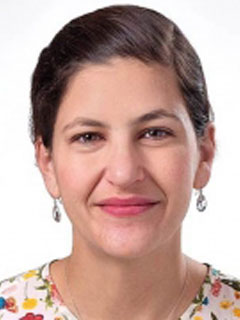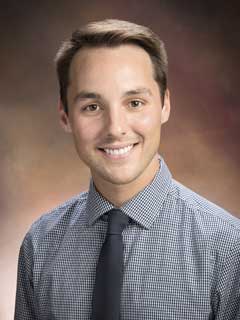HOW CAN WE HELP YOU? Call 1-800-TRY-CHOP
In This Section
Influenza, Antibiotic Use, STAT Wunderkinds, E-Scooters, AAP Award

Start off your Children's Hospital of Philadelphia news journey this week learning about a new role for a molecule in immune reaction to influenza A. Move on to studies about antibiotic use in the NICU and e-scooter accidents. Find out who in the Research Institute are STAT Wunderkinds, and who received a prestigious award from the American Academy of Pediatrics.
'Cryptic' Viral Peptide Drives Large Part of Immune Response in Influenza A Virus Infection
CHOP researchers found a new role for major histocompatibility complex (MHC) molecules: They engage with a cryptic viral peptide derived from influenza A virus and drive a large proportion of the CD8 T cell response after infection. Nature Immunology published the findings.
The researchers used mass spectrometry to study the immunopeptidome in mouse cells infected with influenza A virus to search for unconventional epitopes that might be involved in T cell responses. They identified a nine amino acid epitope that drives a potent CD8 T cell response and found the peptide was unconventional in two ways — it was presented by Qa-1, a non-classical MHC molecule also known as MHC-E (or HLA-E in humans); and the peptide had a cryptic origin, mapping to a part of the influenza virus not typically thought to be translated into proteins.
The researchers then showed that CD8 T cells specific to this cryptic peptide and Qa-1 can be strongly induced by mRNA vaccination and demonstrate cytotoxic activity in mice, raising the hope that this type of immune response could contribute to vaccine protection.
"These results show that non-canonical translation products can account for an important fraction of the T cell repertoire and add to a growing body of evidence that MHC-E-restricted T cells could have significant therapeutic value," said senior author Laurence Eisenlohr, VMD, PhD, an investigator in the Department of Pathology and Laboratory Medicine at CHOP. "Further studies should examine the roles for non-classical MHC molecules and cryptic epitopes in other viral infections, like coronavirus and HIV, and also investigate the implications for diseases like cancer and autoimmunity."
Read more in this CHOP press release.
NICU Antibiotic Use Decreased Substantially in Past Decade
CHOP researchers found that antibiotic use in neonatal intensive care units (NICUs) decreased significantly over the past decade, possibly reflecting the success of antibiotic stewardship efforts focused on the use of antibiotics in hospitalized newborns. The findings appeared in a research letter in JAMA Pediatrics.
The researchers analyzed data from nearly 1.4 million infants from 735 NICUs between 2009 and 2021. They found the proportion of newborns receiving antibiotics decreased by a third, from 54.8% in 2009 to 35.9% in 2021. The overall consumption of antibiotics decreased by nearly half or 48.7%. The most significant reductions were in the use of ampicillin (35.1%) and gentamicin (32.3%), the two most used antibiotics in NICUs.
"Our research shows that we have made significant progress in reducing antibiotic exposure in the NICU — fewer newborns are started on antibiotics, and treatment durations have shortened," said first author Dustin D. Flannery, DO, MSCE, attending neonatologist at CHOP and assistant professor of Pediatrics at the University of Pennsylvania. "However, there is still room for improvement in reducing unnecessary use of antibiotics in the NICU."
See CHOP News.
Two Researchers Named 2023 STAT Wunderkinds

Emma Sartin, PhD, MPH
Congratulations to two CHOP researchers who were selected by the health and science news outlet STAT as 2023 Wunderkinds. This award celebrates the next generation of "scientific superstars" who are making significant contributions to biomedical research. Both scientists were recognized for tackling some of the most challenging problems in pediatric research and were chosen from 172 nominations across North America.
Emma Sartin, PhD, MPH, a research scientist in the Center for Injury Research and Prevention, was recognized for her multidisciplinary approach to understanding racial disparities in child traffic injuries.

Katherine Callahan, MD, MSME
"I love research," Dr. Sartin said in a STAT interview. "If it's a research question that's important and I think is going to help people, then I think it's worth doing."
Katherine Callahan, MD, MSME, attending physician and ethicist in the Division of Neonatology, studies how genetic information is used in caring for critically ill newborns and the surrounding ethical issues.
"In my heart, my job is to be a doctor," Dr. Callahan said in a STAT interview. "I view my research as another way to forward ideas that I believe are useful in taking care of patients."
Pediatric E-Scooter Injuries Rose More than 70% from 2020 to 2021
CHOP researchers found that the number of injuries associated with riding electric scooters (e-scooters) rose by 71% from 2020 to 2021, and teenage boys account for the majority of injuries. The researchers presented their findings at the 2023 American Academy of Pediatrics National Conference and Exhibition.

J. Todd Lawrence, MD, PhD
The researchers used data from the National Electronic Injury Surveillance System database to analyze the injury risk associated with e-scooter use from 2020 to 2021 among those under 18 years of age. During the time period, U.S. emergency departments reported 13,557 e-scooter-related injuries within the pediatric population. The number of injuries rose from 5,012 in 2020 to 8,545 in 2021 — a 71% increase. Most e-scooter injuries were among white males ages 16 to 18 and were reported in the spring and summer.
"At CHOP, the Division of Orthopaedics is committed not only to treating injuries that result from unfortunate events like e-scooter accidents but also to preventing those accidents from happening in the first place," said senior abstract author J. Todd Lawrence, MD, PhD, attending pediatric orthopaedic surgeon at CHOP. "This work emphasizes the importance of educating parents and young riders about the potential risks of e-scooters, as well as safety measures they can take to prevent serious injury."
For more information see CHOP News.
Robert Grundmeier, MD, Receives Byron Oberst Award at AAP
Congratulations go out to Robert Grundmeier, MD, section chief of Informatics for the Division of General Pediatrics and director of Clinical Informatics at CHOP, who received the Byron Oberst Award, presented by the Council on Clinical Information Technology, during this year's American Academy of Pediatrics National Conference and Exhibition.
The Oberst Award is presented to an AAP fellow who has made a significant contribution to pediatric clinical informatics by educating child health professionals in the use of clinical information technology, creating health policies that promote better use of pediatric clinical information systems, and improving pediatric clinical information systems.
Dr. Grundmeier, a transformative figure in pediatric informatics, is the inventor of the CareAssistant framework, which integrates seamlessly with Epic and provides just-in-time-point-of-care decision support for millions of patients visits per year.
"Dr. Oberst was a legend, and I feel very honored to have received the award that was named for him," Dr. Grundmeier said. "I stayed up late the night before receiving the award reading the fascinating transcript of an interview conducted after his retirement. He was an incredible physician, and it was quite humbling to read about his many experiences and accomplishments."
ICYMI
Catch up on our headlines from our Oct. 13 In the News:
- CHOP-led Research Team Selected for $1 Million Transformative Research Award
- CHOP, NJM Partnership Celebrates Virtual Driving Milestones
- Novel Computational Tool Follows Mitochondrial Transfer in Cancer Cells to Gauge Patient Prognosis
- PRCCEH Adds Climate Change as Fifth Area of Focus
- CHOP Researcher Honored by Societies for Pediatric Urology for Kidney Stone Study
Keep up with our news, stories, and updates in real time by following us on Twitter, LinkedIn, or Instagram. Meet the minds behind the science in the Bench to Bedside podcast. Or subscribe to our newsletter to receive an email every other Friday by signing up here.





